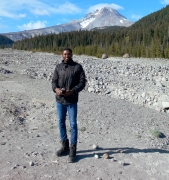

Department of Geology
Portland State University
17 Cramer Hall
1721 SW Broadway
Portland, OR 97201
Email, Phone, etc.
Students: I am almost always looking for enthusiastic students broadly interested in Earth Surface Processes. A strong quantitative background is preferred. Please see the research and publications pages for a sample of past and current projects, and I am always excited to discuss new ideas. PSU graduate students are supported by competitively awarded teaching and research assistantships.

Emma Brady (M.S.), Rates and processes of waterfall escarpment retreat in the Columbia River Gorge, Oregon

Obinna Ozioko (Ph.D.), Controls on deep-seated landslide timing and locations in the Puget Sound region, Washington, USA

Jacque Rheingans (B.S. Honors Thesis), Contrasting bedrock landslide timing and characteristics across an incision rate gradient, Northwest Oregon Coast Range

Cameron Stallcup (B.S. Honors Thesis), Inferring glacial thickenss and basal topography with ice-penetrating radar, Mt. Hood, Oregon
Cody Wilbur (P.S.M.), Engineering and Environmental Geology
Alumni:
Lizzet Reyes (M.S., 2025), Estimated Amounts of Terrestrial Carbon Mobilized and Sequestered by the 1980 Mount St. Helens Eruption, Washington State, USA
Adriana Olvera (P.S.M., 2025), Engineering and Environmental Geology
Anna Tsitsivas (M.S., 2024), Landslide mapping, characterization, and hazard assessment with 3D slope stability modeling in White Bluffs, Washington state, and (B.S. Geology Thesis, 2021), Slow-moving landslide hydrology from precipitation, remotely-sensed soil moisture, and in-situ pore pressure
Ivy Hodgkinson (P.S.M., 2024), Engineering and Environmental Geology
Abbie Underwood (M.S., 2022), Most recent rupture on the Boulder Creek fault triggered significant landsliding in the Nooksack watershed, Whatcom County, Washington
Morena Hammer (M.S., 2022), Post-fire erosional and hydrological processes promoting debris flow initiation in a Douglas fir and western hemlock forest in the Riverside burn area, Oregon
Tiffany Justice (M.S., 2021), Evaluation of Manual and Semi-Automated Deep-Seated Landslide Inventory Processes: Willapa Hills, Washington
Kara Kingen (M.S., 2021), Climatic Controls on the Kinematics of the Hooskanaden Landslide, Curry County, Oregon
Bryce Vascik (M.S., 2020), Amount and Depositional Fate of Carbon Mobilized by Landsliding in SE Alaska
David de Guzman (B.S. Geology Thesis, 2019), Effects of coarse wood in debris flows on mobility and mechanics with discrete element modeling
Christian Sifford (B.S. research assistant, 2019), Geospatial analysis of debris flow runout in southeast Alaska
Cora Siebert (B.S. Honors Thesis, 2019), Using Discrete Element Modeling to Analyze the Role of Coarse Woody Debris in Debris Flow Runout
Rebecca Garriss (M.S., 2019), Modeling surface roughness as an indicator of age and landslide susceptibility, and the spatial inventory of prehistoric landslides: Green River valley, Washington
Max Bordal (M.S., 2018), Quantifying Knickpoint Behavior and Erosion Mechanisms in an Urbanized Watershed, Bull Mountain, Washington County, Oregon, and (B.S. Honors Thesis, 2014), Numerical modeling of the transient response of rivers to tectonic perturbations
Justin McCarley (M.S., 2018), Using Repeat Terrestrial Laser Scanning and Photogrammetry to Monitor Reactivation of the Silt Creek Landslide in the Western Cascade Mountains, Linn County, Oregon, and (B.S. Computer Applications Minor project, 2014), Using image correlation software to measure landslide surface velocity fields
Joann Nelson (B.S. Geology Thesis, 2017), Image correlation of repeat lidar to quantify landslide deformation
Angela Piller (B.S. Honors Thesis, 2016), Landslide hazard mapping in Rwanda using logistic regression
Bryan Allen (B.S. Honors Thesis, 2016), Analysis of hydrologic flow paths within a large landslide complex
Dustin Cramer (B.S. McNair Scholar, 2015), Grain size effects on friction angles of scree slopes